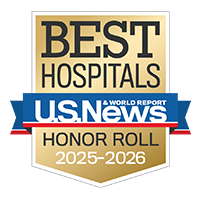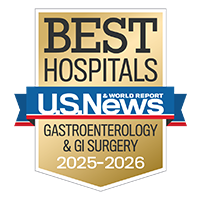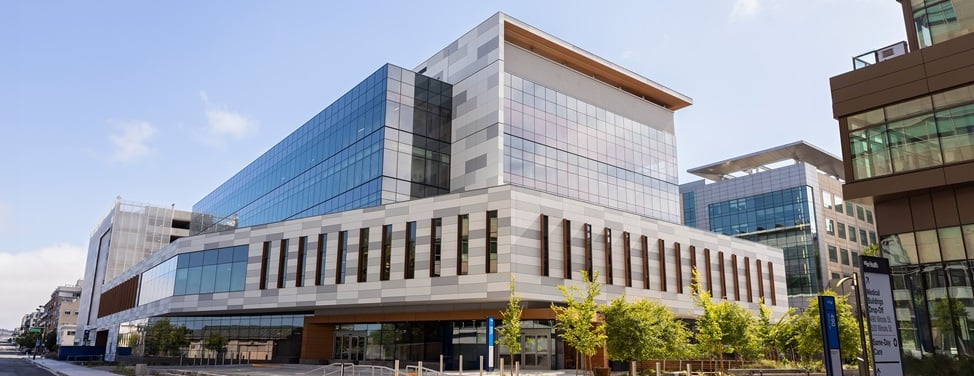
Liver Transplant Program
| Is there someone in your life who wants to donate part of their liver to you? If so, please call (415) 353-1888 and select option 2. Tell the answering staff member that you know someone who's interested in being your living liver donor and that you’d like to be transferred to the new patient intake coordinator for liver transplantation. |
Liver transplant offers patients with end-stage liver disease a second chance at life. The UCSF Liver Transplant Program has made this chance possible for nearly 4,000 patients since its founding in 1988.
Our program, designated a center of excellence by the U.S. Department of Health and Human Services, is known for outstanding outcomes and for helping pioneer techniques to make transplantation safer and more successful. We perform transplants using both deceased and living donors, and are able to perform complex transplants on patients with complicating health conditions, such as portal vein thrombosis. Our team also created new criteria for transplanting liver cancer patients, which are now used in transplant centers across the world and have allowed more patients to become eligible for transplant.
Each patient's treatment team includes surgeons, hepatologists, nurses, physician assistants, pharmacists, dietitians and social workers. Liver transplant pathologists and interventional radiologists also help accurately diagnose and manage liver disease and liver cancer progression before transplant. Our dedicated transplant unit is staffed by nurses and other providers who specialize in caring for liver transplant patients.
Download our new patient handbook (PDF).
Our outcomes
UCSF's adult liver transplant patients have a one-year survival rate that consistently exceeds the national average, according to the Scientific Registry of Transplant Recipients (SRTR). In SRTR's most recent reporting period, our liver transplant recipients had a survival rate of 93.48 percent one year after transplant, compared with a national average of 92.82 percent, and an expected survival rate – meaning the predicted survival rate based on variables indicating how sick or healthy our recipients are – of 92.47 percent.
More outcomes data is available from SRTR and from the Organ Procurement and Transplantation Network.
Doctor referral required
UCSF Liver Transplant Support Group
For UCSF patients living with a transplanted liver or preparing for the procedure
- Meet other people who have undergone liver transplantation or are awaiting transplant.
- Share your experiences and hear what others have to say.
- Get support, give support.
Location: Meetings are currently held online.
Meetings: First and third Thursday of the month, 1 - 2 p.m.
Contact: Email [email protected] for more information and to receive a meeting invitation.
COVID-19 and transplant patients
UCSF strongly encourages patients awaiting liver transplants to get vaccinated. We also recommend that patients awaiting organ transplants follow the guidelines for immunocompromised patients from the Centers for Disease Control and Prevention (CDC).
Liver donation
Becoming a living donor
The gift of an organ offers someone another chance at life. Find out more about the surgery, who is eligible and how to take the first step.
Our locations
Patient education resources
Our team
Clinical trials
Prehab and Creatine/Whey Supplementation in Frailty Among Patients With Cirrhosis
Frailty will be used to assess muscle quality. The liver frailty index (LFI) includes the measurement of grip strength, chair stands, and balance. The Liver Fraity Index typically ranges from 1.0 to 5.0 with the following cut-offs...
Recruiting
Vertical Sleeve Gastrectomy and Lifestyle Modification for the Treatment of Non-Alcoholic Steat...
The scale used is NAS - this is the NAFLD (Nonalcoholic Fatty Liver Disease) Activity Score. The NAS was developed to provide a numerical score for patients who most likely have NASH. Accordingly, NAS is the sum of the separate s...
Recruiting
Awards & recognition
-

Among the top hospitals in the nation
-

Best in Northern California for gastroenterology & GI surgery
-

Designated center of excellence
-

"Elite" rating (highest) among designated programs of excellence
-

in the West for number of living donor liver transplants performed
-

in the U.S. for number of liver transplants performed
Support services
Plan your visit
What to Bring
- Photo I.D.
- Health insurance card
- Insurance authorization, if required
- Doctor's referral, if required
- Recent test results related to your condition
- List of your medications, including dosages, plus any you're allergic to
- List of questions you may have
- Device or paper for taking notes
Related clinics
Our research initiatives
-

UCSF Division of Transplant Surgery Research
The UCSF Division of Transplant Surgery conducts research aimed at expanding medication options, refining surgical techniques and improving methods of preventing transplant rejection.






























































